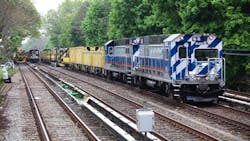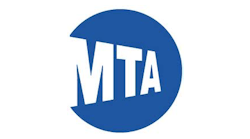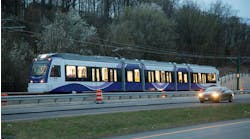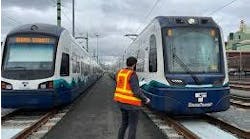MTA Board approves $260.5 million in locomotive contracts
The New York Metropolitan Transportation Authority (MTA) Board approved a contract Wednesday with MotivePower, a Wabtec Company, for the purchase of 25 electric-diesel hybrid locomotives. The contract contains an option for 45 additional hybrid locomotives.
CRRC Times Electric USA LLC, Knoxville Locomotive Works, Inc., and Clayton Equipment Ltd. also bid on the $233-million package.
The 25 MotivePower hybrid locomotives will be delivered in approximately five years, with the first two locomotives arriving within 38 months. The new locomotives will be used on New York City Transit work trains as part of the agency’s ongoing efforts to improve environmental sustainability and health and safety for employees and customers.
The new locomotives will replace NYC Transit’s fleet of diesel-only R37, R41, R43, R47, R52 and R77 locomotives, which were built between 1966 and 1977 and are beyond their 35-year useful life.
Officials from NYC Transit determined that an electric-diesel hybrid locomotive would be the best approach for reducing – and under some circumstances eliminating – fuel emissions during subway construction, maintenance and repairs, especially during extended periods at a work site. The locomotives will have the capability to work in an all-electric “battery only” mode within confined work zones for up to eight hours and will be used to move work trains that must operate at job sites where third rail power is often removed for safety.
The new Motive Power locomotives will be equipped with a GE propulsion battery that will be configured to optimize battery usage and minimize diesel emissions, while also providing the power and capacity required for any job in the NYC Transit operating environment.
The locomotives will be equipped with external and internal cameras and a digital video recorder to capture images of the track, wayside and signals along the length of the track, as well as enhanced on-board monitoring and diagnostics systems that can help technicians maintain and repair the locomotives.
“These new hybrid locomotives will bring two huge benefits to our employees, customers and all New Yorkers,” said NYC Transit Interim President Sarah Feinberg. “They will mean cleaner air in the subway system while we do work on the tracks, and less fuel consumption in our system overall. We are in an incredibly challenged time fiscally, but the health of our employees and customers is too important to delay retiring inefficient old equipment.”
The $233 million to fund the purchase of the 25 hybrid locomotives will come from the MTA’s 2015-2019 Capital Program. The option for up to 45 additional hybrid locomotives, if exercised, would be funded by the 2020–2024 Capital Program.
The locomotives and batteries for this contract will be manufactured in Erie, Pa.
The board also approved a $27.5-million contract with Cad Railway Industries, Ltd., to upgrade and convert 10 R77E locomotives from third rail-powered direct current (“DC”) propulsion to diesel-electric powered DC propulsion.
A staff report on the procurement says the work will increase the number of locomotives that will be readily available for critical work within the NYC Transit subway system.

Mischa Wanek-Libman | Group Editorial Director
Mischa Wanek-Libman is director of communications with Transdev North America. She has more than 20 years of experience working in the transportation industry covering construction projects, engineering challenges, transit and rail operations and best practices.
Wanek-Libman has held top editorial positions at freight rail and public transportation business-to-business publications including as editor-in-chief and editorial director of Mass Transit from 2018-2024. She has been recognized for editorial excellence through her individual work, as well as for collaborative content.
She is an active member of the American Public Transportation Association's Marketing and Communications Committee and served 14 years as a Board Observer on the National Railroad Construction and Maintenance Association (NRC) Board of Directors.
She is a graduate of Drake University in Des Moines, Iowa, where she earned a Bachelor of Arts degree in Journalism and Mass Communication.



